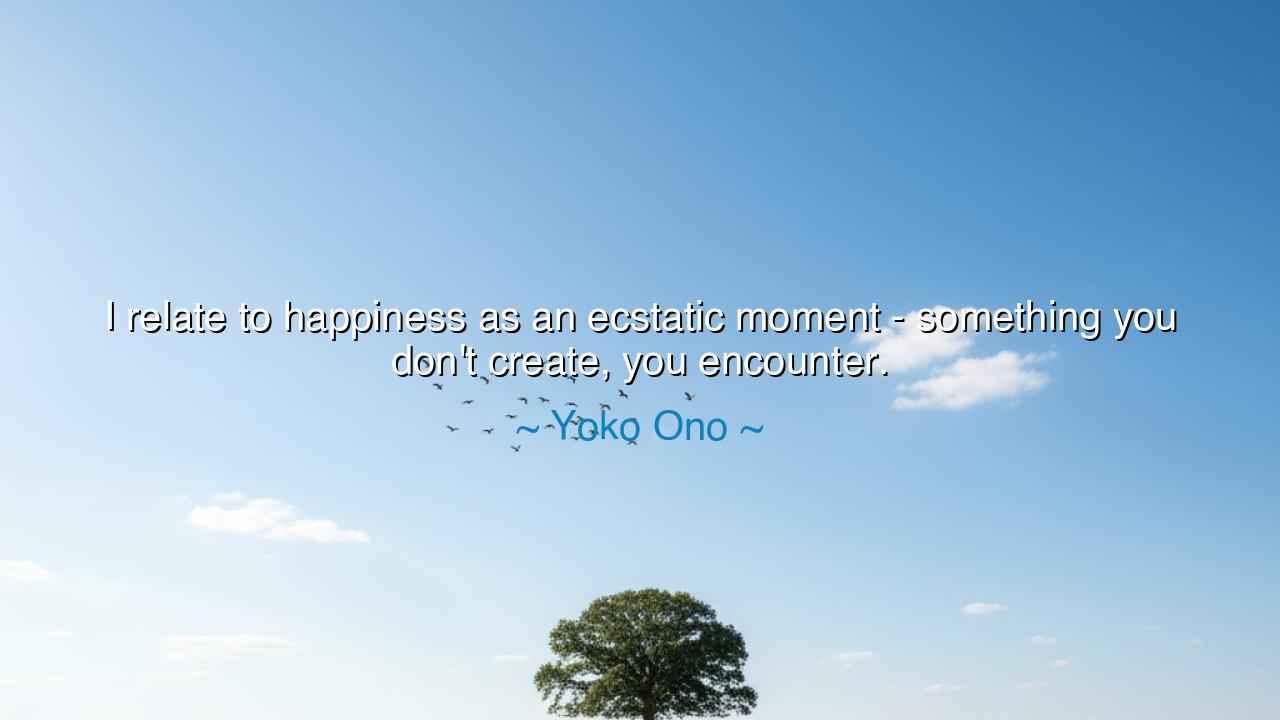
I relate to happiness as an ecstatic moment - something you don't
I relate to happiness as an ecstatic moment - something you don't create, you encounter.






When Yoko Ono said, “I relate to happiness as an ecstatic moment—something you don’t create, you encounter,” she was speaking not as an artist of canvas or sound alone, but as an artist of the spirit. Her words shimmer with the wisdom of one who has walked through both light and shadow, love and loss, and has learned that happiness is not a possession to be built, but a mystery to be met. She reminds us that joy, in its purest form, does not arise from effort or control—it comes suddenly, like sunlight breaking through a cloud. It cannot be crafted, only received.
Yoko Ono, the avant-garde artist and musician, was born into both privilege and war. She endured the bombings of Tokyo as a child and later became both muse and partner to one of the world’s most famous dreamers, John Lennon. She has known adoration and blame, harmony and tragedy. Out of this tapestry of extremes came her understanding of happiness—as fleeting, luminous, and unpredictable. For her, joy is not the outcome of achievement or the reward for virtue. It is a divine visitation, an ecstatic moment that touches the heart and then passes, leaving behind the fragrance of the eternal.
Her words echo the wisdom of the ancients. The Greek philosophers spoke of eudaimonia, the lasting well-being that arises not from pleasure, but from harmony with the soul. Yet Ono speaks of something even more immediate—of the sacred moment, the sudden encounter with beauty or love that awakens the senses to the fullness of life. The ecstatic moment, in her vision, is like a spark from the divine: it cannot be summoned, but when it appears, it transforms. The mystics of every age—Sufi poets, Zen monks, Christian saints—have described this same experience. They did not find joy by seeking it, but by being still enough to notice when it arrived.
Consider the story of Helen Keller, who was blind and deaf from early childhood. For years she lived locked within herself, unable to communicate, unable to touch the world beyond darkness and silence. Then one day, as her teacher Anne Sullivan poured cool water over her hand and spelled the word “water” into her palm, understanding dawned. Helen later wrote that in that moment, her soul awoke. That was her ecstatic moment—not created through striving, but encountered through revelation. From that single encounter, the entire world opened before her. So too does happiness, as Ono teaches, come not through force, but through openness to the sacred moments that life offers.
Ono’s wisdom also contains a warning for the modern soul. We live in an age that chases happiness as though it were a prize—purchased, planned, or performed. Yet the more we seek it, the more elusive it becomes. In truth, happiness is not an object of pursuit but a gift of presence. It arrives when we are fully awake to life—when we notice the wind through trees, the laughter of a stranger, the light in a loved one’s eyes. These moments cannot be manufactured, for they exist outside of the will. They are glimpses of grace. As Yoko Ono suggests, you cannot “create” happiness any more than you can command the tide. You must be there when it comes.
The ancients would call this way of being attunement. To encounter happiness, one must quiet the noise of striving and become receptive to the world as it is. The artist who finds joy in the stroke of a brush, the mother who feels her child’s heartbeat against her own, the wanderer who looks up and sees the stars—each has touched this truth. Happiness is not a destination at the end of a journey; it is the flash of eternity in the midst of the path. It comes when we are too absorbed in life’s wonder to notice that we have stopped chasing it.
So, my children of silence and song, learn from Yoko Ono’s teaching: cease to labor for joy as though it were a possession, and instead prepare your heart to encounter it. Be present to life in its fullness—the sorrow, the beauty, the stillness between breaths. Do not build happiness as though constructing a monument; let it find you in your humility and openness. Like a bird that lands only on still hands, happiness will rest upon you when you stop reaching.
And when it does come—sudden, vivid, and brief—do not cling to it. Let it pass through you, leaving behind its quiet light. For to encounter happiness is to touch the eternal, and to release it with gratitude is to live wisely. Thus, walk through your days not as a seeker of joy, but as a lover of moments. For life, as Yoko Ono teaches, is not about creating ecstasy, but about being awake enough to recognize it when it crosses your path, like a divine whisper in the wind.






AAdministratorAdministrator
Welcome, honored guests. Please leave a comment, we will respond soon